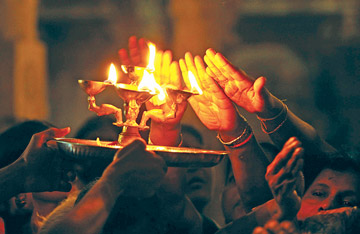Deepavali - the Festival of Lights
Ven. Sumedha (India)
Diwali (also spelled Devali in certain regions) or Deepavali,
popularly known as the ‘festival of lights’, is an important festival in
Hinduism, Jainism, and Sikhism, celebrated for different reasons,
occurring between mid-October and mid-November. For Hindus, Diwali is
one of the most important festivals of the year and is celebrated in
families by performing traditional activities together in their homes.
For Jains, Diwali marks the attainment of moksha or nirvana by Mahavira
in 527 BC.
 |
|
Deepavali
signifies triumph of good over evil |
For Sikhs, Diwali is celebrated as Bandhi Chhor Diwas (The
Celebration of Freedom), and celebrates the release from prison of the
sixth guru, Guru Hargobind, who also rescued 52 Hindu kings held captive
by Mughal Emperor with him in the Gwalior Fort in 1619.
Deepavali is an official holiday in India, Nepal, Sri Lanka, Myanmar,
Mauritius, Guyana, Trinidad and Tobago, Suriname, Malaysia, Singapore
and Fiji.
The name “Diwali” is a contraction of “Deepavali” (which translates
into “row of lamps”. Diwali involves the lighting of small clay lamps
(diyas or dipas) filled with oil to signify the triumph of good over
evil. During Diwali, all the celebrants wear new clothes and share
sweets and snacks with family members and friends.
Financial year
Diwali commemorates the return of Lord Rama, along with Sita and
Lakshmana, from his 14-year-long exile and vanquishing the demon-king
Ravana. In joyous celebration of the return of their king, the people of
Ayodhya, the Capital of Rama, illuminated the kingdom with earthen diyas
and by bursting firecrackers. The festival starts with Dhanteras on
which most Indian business communities begin their financial year. The
second day of the festival, Naraka Chaturdasi, marks the vanquishing of
the demon Naraka by Lord Krishna and his wife Satyabhama. Amavasya, the
third day of Deepavali, marks the worship of Lakshmi, the goddess of
wealth in her most benevolent mood, fulfilling the wishes of her
devotees. Amavasya also tells the story of Lord Vishnu, who in his dwarf
incarnation vanquished the Bali, and banished him to Patala. It is on
the fourth day of Deepavali, Kartika Shudda Padyami, which Bali went to
patala and took the reins of his new kingdom in there. The fifth day is
referred to as Yama Dvitiya (also called Bhai Dooj), and on this day
sisters invite their brothers to their homes.
Besides Hindus, Sikhs and Jains also celebrate Diwali.
Spiritual significance
In each legend, tradition and story of Deepavali lays the
significance of the victory of good over evil; and it is with each
Deepavali and the lights that illuminate our homes and hearts, that this
simple truth finds new reason and hope. From darkness into light - the
light that empowers us to commit ourselves to good deeds, that which
brings us closer to divinity. This is also a Buddhist concept where the
Buddha won the Mara through inner purification. During Diwali, lights
illuminate every corner of India and the scent of incense sticks hangs
in the air, mingled with the sounds of firecrackers, joy, togetherness
and hope. Diwali is celebrated around the globe. Outside India, it is
more than a Hindu festival; it is a celebration of South-Asian
identities.
While Deepavali is popularly known as the “festival of lights”, the
most significant spiritual meaning is “the awareness of the inner
light”. Central to Hindu philosophy is the assertion that there is
something beyond the physical body and mind which is pure, infinite and
eternal, called the Atman. The celebration of Deepavali as the “victory
of good over evil” refers to the light of higher knowledge dispelling
all ignorance, the ignorance that masks one’s true nature, not as the
body, but as the unchanging, infinite, immanent and transcendent
reality.
With this awakening come compassion and the awareness of the oneness
of all things (higher knowledge).
This brings anand (joy or peace). Just as we celebrate the birth of
our physical being, Deepavali is the celebration of this Inner Light.
While the story behind Deepavali and the manner of celebration varies
from region to region (festive fireworks, worship, lights, sharing of
sweets), the essence is the same - to rejoice in the Inner Light (Atman)
or the underlying Reality of all things (Brahman).
Diwali falls on the one new moon night between mid-October and
mid-November. Deepavali is celebrated for five days according to the
Hindu calendar. It begins in late Ashvin (between September and October)
and ends in early Kartika (between October and November).
The first day is Dhan Teras. The last day is Yama Dvitiya, which
signifies the second day of the light half of Kartika. Each day of
Deepavali marks one celebration of the six principal stories associated
with the festival.
Hindus have several significant events associated with Diwali:
* The return of Rama after 14 years of Vanvas (banishment). To
welcome his return, diyas (ghee lamps) were lit in rows of 20.
* The killing of Narakasura: Celebrated as Naraka Chaturdashi, one
day before Deepavali, it commemorates the killing of the evil demon
Narakasura, who wreaked havoc. Krishna’s wife Satyabhama killed
Narakasura during the Dwapara yuga. In another version of the belief,
the demon was killed by Krishna or Krishna provoked his wife Satyabhama
to kill Narshna, defeating Indra.
Lakshmi Pooja
Deepavali marks the end of the harvest season in most of India.
Farmers give thanks for the bounty of the year gone by, and pray for a
good harvest for the year to come.
Traditionally this marked the closing of accounts for businesses
dependent on the agrarian cycle, and is the last major celebration
before winter. Lakshmi symbolizes wealth and prosperity, and her
blessings are invoked for a good year ahead.
[email protected]
|



